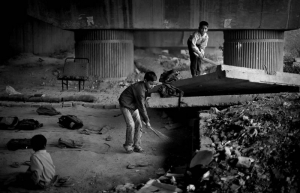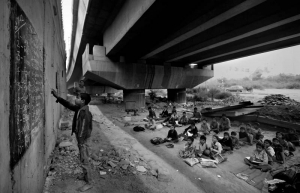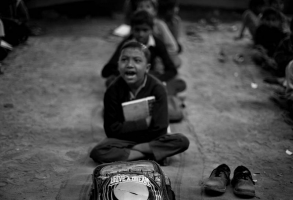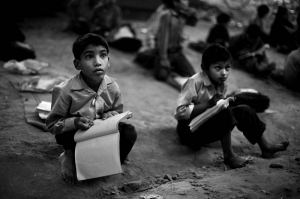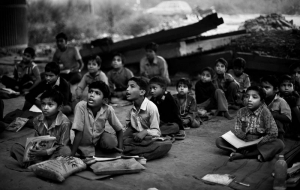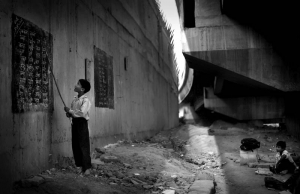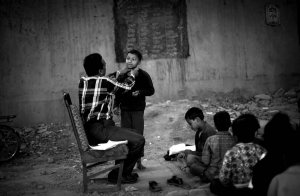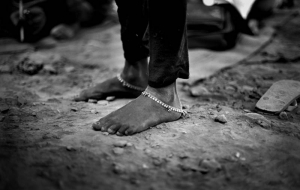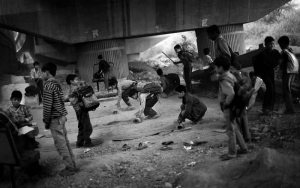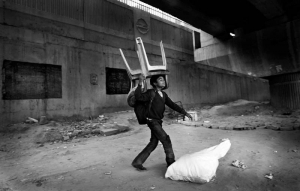Winners of the Alfred Fried Photography Award 2016
School for the less Fortunate
Every morning children from nearby slums arrive in small groups, usually barefoot, carrying mats and brooms. They start by cleaning a section of land under a metro bridge in New Dehli, which will be their school for the morning.
Ten years ago shopkeeper Rajesh Kumar Sharma, with a friend, founded a free school for underprivileged children under the metro bridge. He teaches the children every day for a couple of hours before and after his shop's opening times.
Sharma, a 40-year-old father of three from Uttar Pradesh, India's most populous state, was forced to drop out of college in his third year due to financial difficulties. He didn't want other children to face the same difficulties, so he decided to start the free school. Jury statement: New Dehli. A dirty square under a concrete bridge. Every morning, small groups of children come from a nearby slum. Most of them are barefoot, they bring brooms and torn mats along. They clean the square and sit on their mats. School begins. The teacher: a shop-owner. A man who himself was able to attend school for three years only. Now he helps those who would not know at all what it means to be able to become smarter. He has been doing this for ten years. In the morning before he opens his shop. Often also in the evenings.
At international symposiums education is traded as the key to any change for the better in this world, not least as the key to a more peaceful world in which knowledge and enlightenment will win over agony and hostility. There, under a bridge in New Dehli, children sit on rubble and dirt in front of two boards on a bare wall, surrounded by traffic, enjoying a privilege which should not be one any more. It should be a human right: the right to learn how to read and write and comprehend.
The rapt attention in their faces, the concentration, the tenderness, the smiles… The photographer Atlaf Qadri, born in Kashmir, has made the pictures of this ‘School for the less fortunate’ a touching document of hope. Having travelled through many war zones, he has probably achieved more with his work in New Dehli than by witnessing dramatic political events. Qadri’s story of a charitable man who went under a bridge one day to teach the children how to learn has become a gift. Jumpers and shoes and socks are the gift. School bags and blankets. And even a few plastic chairs. And a potable water dispenser.
Do we see a happy end here? Of course not. In this world there are still 50 million boys and girls who cannot attend any school at all. But what we see is encouraging. An encouragement for photographers. An encouragement linked to the Alfred Fried Award. Do not all go where it is loudest. Do not only follow the holes where granates landed, the earthquakes, the combatants. The decision-makers. Or the brilliant. Also look for what is happening on the lee side of the big stories. Because sometimes something will begin exactly there, something that we might even call peace one day.
Photos by Altaf Qadri
Every morning children from nearby slums arrive in small groups, usually barefoot, carrying mats and brooms. They start by cleaning a section of land under a metro bridge in New Dehli, which will be their school for the morning.
Ten years ago shopkeeper Rajesh Kumar Sharma, with a friend, founded a free school for underprivileged children under the metro bridge. He teaches the children every day for a couple of hours before and after his shop's opening times.
Sharma, a 40-year-old father of three from Uttar Pradesh, India's most populous state, was forced to drop out of college in his third year due to financial difficulties. He didn't want other children to face the same difficulties, so he decided to start the free school. Jury statement: New Dehli. A dirty square under a concrete bridge. Every morning, small groups of children come from a nearby slum. Most of them are barefoot, they bring brooms and torn mats along. They clean the square and sit on their mats. School begins. The teacher: a shop-owner. A man who himself was able to attend school for three years only. Now he helps those who would not know at all what it means to be able to become smarter. He has been doing this for ten years. In the morning before he opens his shop. Often also in the evenings.
At international symposiums education is traded as the key to any change for the better in this world, not least as the key to a more peaceful world in which knowledge and enlightenment will win over agony and hostility. There, under a bridge in New Dehli, children sit on rubble and dirt in front of two boards on a bare wall, surrounded by traffic, enjoying a privilege which should not be one any more. It should be a human right: the right to learn how to read and write and comprehend.
The rapt attention in their faces, the concentration, the tenderness, the smiles… The photographer Atlaf Qadri, born in Kashmir, has made the pictures of this ‘School for the less fortunate’ a touching document of hope. Having travelled through many war zones, he has probably achieved more with his work in New Dehli than by witnessing dramatic political events. Qadri’s story of a charitable man who went under a bridge one day to teach the children how to learn has become a gift. Jumpers and shoes and socks are the gift. School bags and blankets. And even a few plastic chairs. And a potable water dispenser.
Do we see a happy end here? Of course not. In this world there are still 50 million boys and girls who cannot attend any school at all. But what we see is encouraging. An encouragement for photographers. An encouragement linked to the Alfred Fried Award. Do not all go where it is loudest. Do not only follow the holes where granates landed, the earthquakes, the combatants. The decision-makers. Or the brilliant. Also look for what is happening on the lee side of the big stories. Because sometimes something will begin exactly there, something that we might even call peace one day.
Photos by Altaf Qadri
